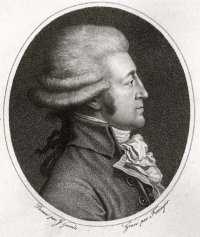Stanislas Marie Adelaide, comte de Clermont-Tonnerre

Stanislas Marie Adélaïde, comte de Clermont-Tonnerre (October 10, 1757 – August 10, 1792) was a French military officer, and a politician during the French Revolution.
Early life and career
Born in Mandres-aux-Quatre-Tours in the Duchy of Bar, in what is today the Meurthe-et-Moselle department in north-eastern France, Stanislas is the eldest son of François-Joseph, marquis de Clermont-Tonnerre (1726-1809) and his first wife, Mary Anne de Lentilhac de Gimel, and the grandson of Gaspard, duc de Clermont-Tonnerreb (1688-1781), marshal of France. Following in the family tradition, he became colonel of the 1st regiment of cuirassiers.
He married (in 1782) Mary Louise Josephine Delphine de Rosieres de Sorans (December 1766 - October 26, 1832, Paris), lady-in-waiting to Princess Élisabeth of France, sister of Louis XVI. She bore him three children, of whom only the eldest daughter survived into adulthood, marrying (in 1803) Esprit Louis Charles Alexandre Savary de Lancosme (1784-1853).
Prior to the beginning of the French Revolution he was a Freemason, a noted orator, (having acquired practice in speaking in the Masonic Lodge) and a Liberal.
French Revolution
He was elected to the Estates-General of 1789 by the Second Estate of Paris, and was the spokesman of the minority of Liberal nobles (including the duc d'Orléans and the marquis de Lafayette) who joined the Third Estate on the 25th of June.
He voted for the motion of the vicomte de Noailles to abolish feudalism in France 4–5 August 1789.
Clermont-Tonnerre desired to model the new constitution of France on the organic laws of England. He served on the first incarnation (established 17 July 1789) of the eight-member Constitutional Committee. When the National Assembly rejected its proposals for a bicameral legislature and an absolute veto for the Crown (10–11 September 1789), he resigned along with five fellow conservatives (including Jean Joseph Mounier). For the remainder of the tenure of the National Assembly he attached himself to the party of moderate Royalists, known as monarchi gens, led by Pierre Victor, baron Malouet.
He was twice elected president of the National Constituent Assembly in rapid succession (17–31 August 1789; 9–28 September 1789).
Conflict with the Jacobins
His political views earned him the animosity of radical politicians of the Palais Royal; but in spite of threats and abuse he continued to advocate a moderate liberal policy, especially in the matter of removing restrictions for the Jews and Protestants and of extending the system of trial by jury.
In January 1790, he collaborated with Malouet in founding the Club des Impartiaux and the Journal des Impartiaux, the names of which were changed in November to the Société des Amis de la Constitution Monarchique and Journal de la Société, &c. in order to emphasize their opposition to the Jacobin Club. Their Société des Amis was denounced by Antoine Pierre Joseph Marie Barnave in the Assembly (January 21, 1791), and on March 28 it was attacked by a mob, whereupon it was closed by order of the Assembly.
Last Days
Clermont-Tonnerre was arrested after the Flight to Varennes (21 June 1791). He was released 10 August 1792, only to be murdered by the people of Paris during the riots - the Storming of the Tuileries, Palace).
References
 This article incorporates text from a publication now in the public domain: Chisholm, Hugh, ed. (1911). Encyclopædia Britannica (11th ed.). Cambridge University Press. In turn, it gives the following references:
This article incorporates text from a publication now in the public domain: Chisholm, Hugh, ed. (1911). Encyclopædia Britannica (11th ed.). Cambridge University Press. In turn, it gives the following references:
- Recueil des opinions de Stanislas de Clermont-Tonnerre (4 vols., Paris, 1791), the text of his speeches as published by himself
- A. Aulard, Les Orateurs de la Constituante (2nd ed., Paris, 1905).